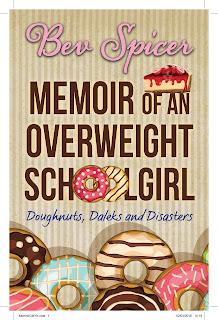'Memoir of an Overweight Schoolgirl' is set in the thriving market town of Bridgnorth and is anecdotal. The author recounts memories of her early life and the time she spent as a student at Bridgnorth Grammar School (now Bridgnorth Endowed School).
Funny, unsentimental and totally immersed in the sixties and seventies - this memoir will take you back to lard-based products, Motown discos and the world of grammar school education.
Here's an excerpt during which Bev discovers that, despite her puppy fat and poor fashion choices, she has the power to attract BOYS:
...Whether these private musings had made me sway my
hips more appealingly, and perhaps, who knows, appear on the verge of physical
as well as intellectual ecstasy, I couldn’t say, but what happened next was
confusing in the extreme and, at first, barely pleasant, despite its undeniable
potency: I had attracted the attentions of a group of boys who had apparently
camped out in the park and were gathering for a stroll around the town. My radar told me they were not local. They were of various heights, ages and
beauty, but all equally terrifying to a girl who had been warned of the dangers
of flesh-and-blood members of the opposite sex, who were to be viewed as
predators, rapists and generally dirty buggers. I had inadvertently strayed into their environment and set off a
flurry of uncontrollable desire amongst them. Lordy! What was a girl to do?
I walked on by, nonchalant and sweating, my eyes
working overtime to gather essential detail.
Could it be that one of them looked like Davy Jones, afore-mentioned
singer and Daydream Believer, with The Monkees? I was prepared to believe.
Indeed, I needed to believe.
Having circled away, I then cut back to return along
the same path I had come. After all, I didn’t want to give them the slip too
easily. They called out, whistling and complimenting me. I flicked my hair, like the Sunsilk girl,
and pretended to look the other way. To
my delighted horror, they followed.
What would my father say? There
was bound to be someone who knew him watching me from the bushes. My tennis skirt seemed to shrink and my tiny
bosom inflate. My vest wasn’t thick
enough.
The boys followed at a distance. I was flattered
beyond measure and yet inordinately unready.
In the absence of experience, I determined to remain aloof. Quickening my step, I made it to the bridge,
where, had I not looked back, I believe they would not have continued their
pursuit. As it was, one of them called
out for me to wait and they showed no signs of giving up their romantic quest
for my attention. This was
serious. And amazing. It involved real boys, who didn’t seem
to be worried by my bulk. What was
more, one or two of them weren’t bad-looking!
Mandy was inside the house when I burst in, all
blushes and giggles. Instantly keen to
collaborate, she joined me in a jumping dance, punctuated by girly
squeals. Soon we put a hastily
conceived plan into action: we hid behind net curtains, watching as, to our
stomach-twisting joy, five boys seated themselves more or less sexily on the
garden wall at the front of our house.
Never had I taken in so many breaths without exhaling. Mandy (my nine-year-old prettier sister) was
impressed at my ability to lure such an impressive crowd to our lair. Luckily, there was no imminent danger of my
father arriving home to demand what on earth was going on, so we gasped and
stared, and failed to take any kind of action.
“Who are they?” Mandy asked. “I like the one with short dark hair
best. What’s his name? Are they gypsies?”
I gaped. I couldn't answer a single question. Were they gypsies? Did it matter?
I gaped. I couldn't answer a single question. Were they gypsies? Did it matter?























